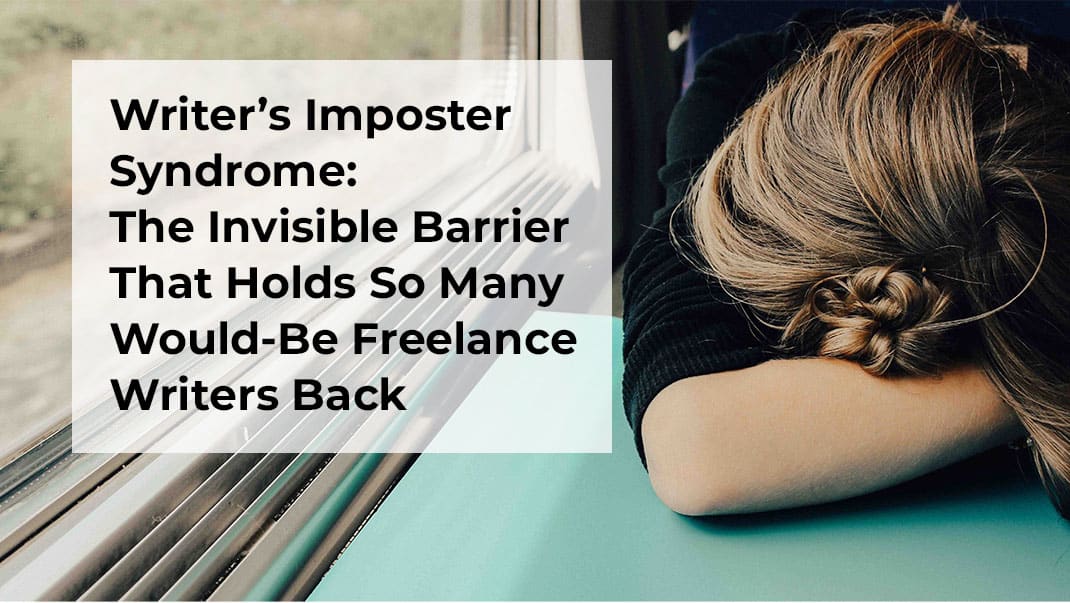Writer’s Imposter Syndrome: The Invisible Barrier That Holds So Many Would-Be Freelance Writers Back
“I’m a fraud.”
Ever thought that? Ever thought that as soon as you even considered taking action towards becoming a freelance writer?
You’re not alone. Most writers have suffered from writer’s imposter syndrome at one point or another.
Many writers still have it, but have been able to take forward action despite it. Others have imposter syndrome so bad that it paralyzes them from doing anything.
How imposter syndrome shows up
Writer’s imposter syndrome wears many masks. It comes in many forms. It shows up in freelance writing in all sorts of creative ways, and it has a particular genius for morphing into self-sabotage, procrastination, and low self-esteem.
Before we talk about how to beat your imposter syndrome, let’s get clear about what it is and how it can show up in your writing.
Some writers’ imposter syndrome takes the form of undercharging for their work. So even after they’ve gotten degrees in journalism and writing, even after they’ve written successful newspaper columns for years, even after publishing tens of thousands of words, they still charge $20 per hour.
Other writers’ imposter syndrome may cause them to put off working on an article for so long that they miss a deadline. That missed deadline ends up hurting their relationship with the promising new client. Because they couldn’t meet their deadline, the client decides to look elsewhere. The writer’s imposter syndrome has now killed that opportunity.
Or maybe the writer has a great idea for an article, but it never goes anywhere. They never finish the article, and they may not even start it. Every time the writer thinks about it, their imposter syndrome whispers about how no one wants to hear what they have to say. This negative self-talk quashes their enthusiasm just enough to reduce their energy, make them feel tired, and so they never even try to write the article.
Or the writer’s imposter syndrome doesn’t mess with their deadlines, but it causes them to play safe. They don’t present the big, bold ideas they’ve got. Instead, they just stick with the boring, well-trodden topics. Who are they to break the mold, to do something unusual… something that might fail? And then maybe their depressive side kicks in and tells them that their client doesn’t want new ideas anyway.
Ever thought about using a pen name?
I know one writer who has multiple engineering degrees, great writing skills, and even a Sales background – the sort of writer who is worth her weight in gold to the right company. She asked me if she could use a pen name.
She wanted to use a pen name because it would allow her to not have her name be so visible. The pen name, basically, would give her a way to hide.
She’s not the only writer I’ve spoken to who has brought up using a pen name. And this isn’t for fiction writing, either. This is for professional content writing. The sort of writing where most writers will petition for a byline – will be willing to get paid less in exchange for a byline – because they know it can help them get more work and because it gives them a valuable clip.
If you’ve ever pondered using a pen name, you probably have writer’s imposter syndrome.
Writer’s imposter syndrome and procrastination
As you can probably guess, imposter syndrome also bleeds into lack of confidence, seeps into low self-esteem, wanders into projection, and fuels procrastination. This can show up as an absolutely brilliant ability to create additional work that just has to be done before any real action is taken towards getting freelance writing clients and actually billing hours.
There are plenty of evasion tactics to choose from, but websites seem to be the worst culprit. “I’ll start pitching clients once my website is up,” sounds so reasonable. So responsible. And yet, three months later, the website is just getting more and more elaborate, and yet is still “just not quite ready” to be seen by clients.
How to overcome imposter syndrome
1. Call it out.
One of the best tips I’ve heard of for getting free of imposter syndrome is to just start calling it what it is. So whenever you catch yourself thinking or saying something that can be distilled down to “I think I’m a fraud,” immediately speak up and say “This is imposter syndrome.”
You’re a writer, right? So let’s call things by their names.
For example, whenever you try to justify adding another section to your website, you say, “this may be imposter syndrome under cover, trying to get me to do anything but take meaningful action.”
Calling out your writer’s imposter syndrome out will start to help you see that it is not you. Calling it out puts a small wedge between you and it. “It” is a shadow, a parasite, an evasion tactic.
“It,” as Steven Pressfield describes so perfectly, is resistance. And when you stop identifying with your imposter syndrome, then you start gaining the upper hand on it.
2. Take action.
Imposter syndrome, in its plainest form, is just a lack of confidence. We can get all fancy with the words and the psychology, but at its dumbed-down, most fundamental state, imposter syndrome is a confidence issue.
And there’s no better way to build confidence than taking action.
Even if what you try fails — you’ll start to believe in yourself simply because you got out there and tried something. The pain and judgment we often feel simply from our inaction is incredible. So even if what you try “fails” to some extent, you still broke through: YOU DID SOMETHING. And more often than not, what you’ll try will work, even if in a small way.
If you’ve been paralyzed by imposter syndrome for even a little while, just breaking the streak of inaction is reason enough to feel better about yourself.
A lot of the inaction freelance writers suffer from is simply because they aren’t used to doing things to move their freelance writing business forward. They’re stuck in the phenomena of “an object at rest tends to stay at rest.” Or, in other words, they simply don’t have any momentum going yet.
So try to build a habit of taking action. Even tiny action. It may take some focus, intention, and grit to, say, sit down and write for twenty minutes the first few times. But after a few weeks, it’s WAY easier.
Do you know what else will happen after those tiny actions? You’ll have evidence of you NOT being an imposter. Keep building the evidence, and eventually you’ll be less susceptible to the nasty little voice. You’ll get to the point where you still hear it, but what it tells you just doesn’t stick anymore.
At a certain point, after writing for many clients, and publishing many excellent articles, you will hear that evil little voice in your head say, “you’re a fraud,” and you will finally think back: “Oh, buzz off.”
You won’t be susceptible to it anymore.
Or (to be honest), you’ll be less susceptible to it.
The problem is, that you may have to plow through all those uncomfortable actions first. You need enough will to just take action no matter how loud your imposter syndrome shrieks at you.
I realize you probably wanted me to just give you some magic idea, or to just wave a digital wand at you so you could get over this, but that’s not how it happens.
But honestly, when we finally realize that things aren’t going to magically change – when we stop telling ourselves the lie that someday, without effort, this block will dissolve on its own – that’s when we usually find the will to just go forward anyway, whether it’s uncomfortable or not.
As Jen Sincero says, “you have to want your dreams more than your drama.”
3. Embrace it.
Here’s another way to crush imposter syndrome: When that nasty little voice whispers, “you’re a fraud,” flip it. Give yourself permission to be a fraud.
Forgive yourself for being a fraud. Step out, fraudulently pretending to be a freelance writer, and forgive yourself for doing it. Just give yourself a permission slip to be a fraud.
“So I’m a fraud. But dammit, I’m going to be a damn good fraud.”
So go be a damn good fraud. Pick a writing niche that lights you up and lets you charge like a lawyer. Pitch clients like you know you can earn hundreds of thousands of dollars for each one of them. Write with pizzazz and panache. “Fake it ‘til you make it.”
Be the best fake freelance writer anybody’s ever run into.
4. Deliberately screw up.
Perfectionism is another thing writers tend to have in spades. A friend of mine once shared with me how to get an edge on it. Not to defeat it – you may never defeat it forever, honestly. You have to defeat it and redefeat it every day. But you can get an edge on it.
Here’s how: You deliberately screw up.
Terrifying, I know. You start by picking really tiny, super-minor deliberate ways to screw up.
Every day. You deliberately embarrass yourself by, say, wearing your shirt inside out while on a quick errand. Or by letting your phone ring in a meeting (extra credit if it’s a meeting you called). You leave your hat in a restaurant. You let a typo go in an email to a client.
Every day. One little embarrassment. One little screw up.
And still, the sun rises. You live. Over time you build up your anti-perfectionism muscles. Over time, those anti-perfectionism muscles get downright shapely, and you start having an easier time beating your perfectionism back.
Here’s how this played out for me recently. I was doing a planning session a few weeks ago, first thing in the morning.
I was exhausted… the kind of exhausted where you wake up more tired than when you went to bed. The exhaustion was eating into my faith in myself. And I had a huge list of things to do that I had never done before. Things I was not confident in my ability to do.
After some serious thinking around the idea of “what’s the worst that could happen?” and “fake it til you make it,” and the ugly possibilities of what would happen if I did nothing (because the good side of myself would never let me forget it) I finally hacked out an achievable to-do list for the day. Then I looked up and said, “OK… let’s get out there and screw up!”
This fear of screwing up is often another part of the beast of writer’s imposter syndrome, the part that likes to morph into perfectionism. It’s this belief that if we do something wrong – anything wrong – we’ll be scalded with shame and called out publicly as frauds.
But here’s the reality: The outright frauds? The real imposters? They don’t have imposter syndrome.
Only people who are somewhat good, or know they could be good, get imposter syndrome.
In fact, you might want to be proud of your imposter syndrome. You share it with some of the world’s most amazing, gifted, bravest people.
5. Make a confidence board.
You’ve probably heard of vision boards: They’re an area where you pin up images of everything you want – all your wildest dreams.
A confidence board is where you pin up, say:
- Any nice comment or testimonial you’ve ever gotten about your writing.
These could be blog post comments, praise from a client, or a nice email from an Editor. They could even be LinkedIn recommendations you’ve received.
- Any award you’ve ever gotten.
For anything. If you won the spelling bee in third grade, post it.
- Any clips or published pieces you’re particularly proud of.
- Inspirational quotes, social media memes, or stories you love.
- Photographs of people who inspire you.
- A mocked-up, fake byline with your name that makes it look like you’ve been published in your dream publication.
- Your degrees or official certificates (extra credit if you get them framed).
- Any symbol of someone loving you.
A card from your Mom, for instance. Or an especially nice note from your spouse.
Even failures can become confidence board builders. When I was a teenager and an aspiring poet, I decided I was going to paper a wall with rejection slips. And I did. Along the way, I got two dozen poems published before I turned 18.
Use whatever you’ve got. Put your confidence board where you can see it ALL THE TIME. Let all those nice, supportive words seep into your subconscious. Let them slowly work on dissolving your imposter syndrome.
6. Define what “real” writers do.
Imposter syndrome is, fundamentally, about dismissing ourselves. Saying that what we do and who we are doesn’t count. It is a tactic we use to diminish ourselves, despite all evidence to the contrary.
Evidence alone won’t dispell imposter syndrome, but it can make imposter syndrome become less and less believable.
Here’s how to apply this: Sit down and define things that “real” writers do or have.
Do real writers write every morning? Do they get paid for their work? Do they get bylines? Book deals? Official checkmarks on their Twitter profiles?
Whatever you believe about “real” writers, put it down on paper.
And now, start implementing your list. Start working toward all these things you think real writers do, or don’t do.
Go check the biographies of writers and artists if you need to. Find out how “real” writers do their work. Or don’t do their work. Or procrastinate their work, or create drama to avoid their work, or put off doing their work because they’re struggling with imposter syndrome.
Odds are, you already do or embody at least one or two of the things “real” writers do.
This is an excellent start. The next step is to just build up the evidence of you being a “real” writer by adding one thing “real” writers do to your life every month.
Just one thing. No more.
Do not go overboard. We want a sustainable habit, not bursts of activity that fizzle out.
7. Join a program or find a group of people that will help you move into action (even if you are still terrified and resistant).
Surrounding yourself with people who are scared but doing it anyway is a terrific way to just leap into action despite yourself.
Seeing other people take action helps you see that:
a) Taking action is not as dangerous as you think.
b) Taking action feels really awesome once you’re on the other side.
c) Taking action actually freaking WORKS.
What is your writer’s imposter syndrome costing you?
It would be unfair to close this article without addressing the pain of imposter syndrome. It makes us deny our own deepest desires. That hurts.
But even that pain also holds the kernel of a solution. For many writers, they only finally take action when they realize the pain of not doing has exceeded the pain of doing. They get to the point where not taking action is costing them more than what just busting through their imposter syndrome would take.
Don’t kid yourself: Not taking action is heartbreaking in it’s own way. We burn up years making excuses. Moving forward – even if you’re a fraud, even if you fail – may be terrifying and painful. But if you’re lucky, at some point, it becomes the path of less resistance.




